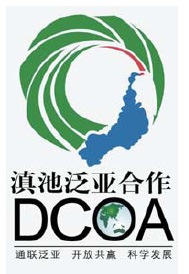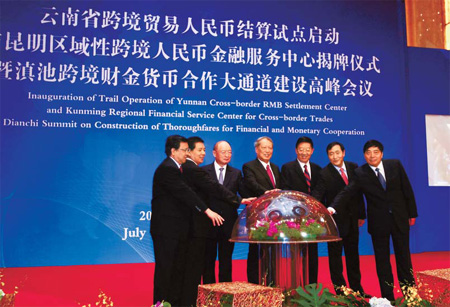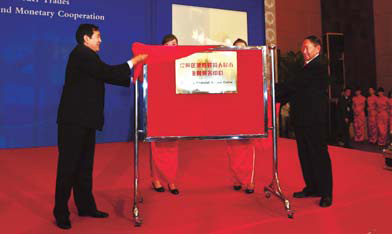News
Banks debate RMB internationalization
(China Daily)
Updated: 2010-09-06 08:00
 |
Large Medium Small |
|
Dianchi summit: Yunnan province, less than 1,000 km from the Indian Ocean, was cited as a key location for establishing cross border transport. Officials hope Kunming can become a commodity distribution center and prime investment destination. Leaders at the forum discussed hopes for cross border trade payments in renminbi, part of China's push to internationalize its currency. The event was named after Dianchi lake, a well known tourist resort in Kunming. Photo Provided to China Daily |
|
Presenters unveil a plaque to be displayed at the new Yunnan Cross-Border Renminbi Settlement Center. |

Editor's note: Several bank leaders met to discuss regional currency cooperation and RMB settlement at the recent Dianchi financial forum. Their speeches are featured here.
Wei Benhua, former deputy director, State Administration of Foreign Exchange
The most important reason Asia saw much less loss than America and Europe during the global economic crisis is that it has a good financial system. It is under strict supervision and has sufficient capital and good operating practices.
The huge amount of foreign reserves of Asian countries and regions also helped them weather the crisis. In 2009, Asia's economic entities' foreign reserves topped $5.2 trillion.
During the 1998 Asia financial crisis, we learned we need to establish a lender of last resort .
Several currency swap agreements were signed in 2000 between Asian countries to enhance their cooperation in lowering financial risks, but that is far from enough to combat the shock of a crisis from the outside.
In 2007, financial ministers of the Association of Southeast Asian Nations (ASEAN), China, Japan and South Korea, decided to build the bilateral currency cooperation into a multi-lateral mechanism.
They called for a regional foreign reserve pool that requires member countries to provide a certain amount of capital to a country in need.
However, the capital in the pool is managed separately by each country. A unified supervision and management mechanism is not available. Whether the country in need can get financial aid in a timely manner is therefore in doubt.
Cheng Zhijun, deputy director-general, Ministry of Finance
The internationalization of a country's currency can increase its say in global economic affairs and lower the exchange rate risk. It can also promote the country's economic and trade development.
But we have to notice that currency internationalization is in line with the country's economic power.
Although China's economic volume is as huge as the US, Britain and Japan, China's per capita GDP is still at the mid and low-income levels.
In recent years, RMB has become a de facto currency of settlement and payment in the neighboring countries of Russia, Vietnam, Thailand, Myanmar and the Democratic People's Republic of Korea.
The ministry has been supporting RMB's regionalization. Cross-border trade in RMB has enjoyed a tax rebate or exemption since 2010.
The ministry also issued 6 billion RMB treasury bonds in Hong Kong last year to promote RMB settlement.
In 1998, the ministry initiated a dialogue between ASEAN countries, China, Japan and South Korea. This has laid a foundation for RMB's regionalization.
The expansion of RMB cross-border settlement will be beneficial for China's border provinces like Yunnan, and neighboring countries.
Md. Ahsan Ullah, executive director, Bangladesh Bank
There is no doubt that globalization is occuring due to the tremendous development of communication networks.
It is also a fact that regional financial and monetary cooperation is occuring. ASEAN, SAARC, and BIMSTEC are becoming more consolidated. And the Kunming initiative is a great step forward.
In addition to regional cooperation in trade & finance, bilateral cooperation is on the rise. Many countries are implementing free trade policies.
It is worthwhile to mention that while the ASEAN has been considerably successful, SAARC has not - despite its birth more than 25 years back.
There is an Asian Clearing Union System that exists in India, Bangladesh, Sri Lanka, Nepal, and Iran. In order to establish an RMB cross border payment system, we have to develop a modus operandi like that. I believe that it may take a little bit of time, but it's not impossible.
Gong Fangxiong, general manager, JP Morgan Asian-Pacific branch
It is just the right time to propose to pilot RMB's cross-border trade settlement while China's trade in Asia has made the currency a basis for Asia's trade settlement.
China's foreign trade is good in terms of exports. But the RMB lacks influence and purchasing power and is not a freely convertible currency.
The country needs to step up efforts to make the RMB convertible and to promote goods which can be invested and priced by the currency.
RMB settlement can be carried out first in the border areas and then seek regionalization and internationalization. But this is not the sole road, and the demand for RMB settlement should be increased.
Zhou Jiangong, editor-in-chief, Chinese-language edition of Forbes magazine
The first step for the RMB's internationalization should be its regionalization among neighboring economic entities which have close trade and investment ties with China.
Yunnan, as a border province in Southwest China, is crucial for the Chinese currency's regionalization.
In 2004, China's central government made tax rebate policies to encourage Yunnan's enterprises to use the RMB in cross-border trade. Now, more than 95 percent of the province's cross-border trade is settled with RMB.
RMB reserves in Vietnam, Myanmar and Laos are estimated to have topped 20 billion yuan, and annual RMB settlement volume is expected to reach 10 billion yuan after the RMB cross-border settlement is formally launched.
Cross-border trade in Yunnan will be further speeded up as the pilot program of RMB cross-border settlement expands.
China's growing investment in ASEAN countries will promote the RMB's importance in the free trade area.
Yi Huiman, vice president, Industrial & Commercial Bank of China
In an age of global economic restructuring, deepening financial and monetary cooperation in Pan-Asia serves the common interests of the parties concerned.
Cross-border RMB settlement, in particular, brings huge social and economic benefits.
It meets the growing needs of the enterprises for easier transaction and boosts regional trade. It helps enterprises avoid risks as foreign exchange rates of major currencies continue to fluctuate. It also sets the stage for other creative financial products and services.
Therefore, Industrial & Commercial Bank of China (ICBC) looks to it as a key growth area. ICBC is an important player in the global financial sector. As the most powerful bank dealing with the RMB settlement, ICBC takes the lead in risk management and service networks.
Pan-Asia is mainly composed of rising economies and developing countries. It is one of ICBC's target markets. Since its first foreign branch appeared in Singapore in 1992, ICBC has embarked on an ambitious venture to compete in the global arena.
Over the past years, it has been operating in more than 20 countries and has gained acceptance by local businesses.
Looking forward, ICBC is ready to strengthen cooperation with other Asian countries in cross-border RMB settlement by expanding its service network and providing more innovative financial services.
Yang Liping, Banking Supervision Department III director, China Banking Regulatory Commission
As the major watchdog of China's financial sector, China Banking Regulatory Commission (CBRC) has opened the domestic market and allowed China's banks to compete on the global arena.
The efforts have born ample fruit. The total assets possessed by China-based foreign banks stood at 1.5 trillion this June, up from 300 billion in 2003.
CBRC helps the localization of banks while supporting their healthy development. It is attracting more foreign banks to operate in western and southeastern parts of China, which are in bad need of capital.
At the same time, CBRC encourages banks to invest in rural areas, medium and small enterprises and similar capital-strapped fields.
CBRC also encourages foreign banks to share experience in risk management and accelerate the internationalization of RMB.
Since Yunnan is an important communication hub in Asia, it has become a critical front in China's commitment to building the China- ASEAN Free Trade Zone.
Guan Jianzhong, president, Dagong Global Credit Rating Co Ltd
Cross-border financial and monetary cooperation is something of credit cooperation, or internationalization of credit, by nature.
Two problems that may arise in this process are credit risks and information imbalance. Information imbalance, in particular, is an urgent issue.
China's credit has enormous impact on the value of RMB and the confidence of its holders in other countries. A credit rating platform is badly needed. With such a mechanism in place, investors can reduce possible risks. It is more than a financial system; it is also a system that has to bear social responsibility.
Rapid development of cross-border RMB settlement surely will encourage more Chinese enterprises to invest overseas. Supported by a scientific credit system and rating system, China and its neighboring countries will be on a fast track towards closer cooperation.
Fang Xinghai, Shanghai Financial Services Office director, Shanghai municipal government
More efforts should be taken if we are to transform Kunming into a financial center in cross-border RMB settlement.
To begin with, we should expand the service network. Banks in China and other Pan-Asian countries have to expand their service networks in each other's markets.
Yunnan, however, still has to improve local banking services, and concentrates on market expansion in neighboring countries.
On the other hand, Yunnan has to cooperate with other parts of China. It must fight for a bigger share in the growing domestic market.
Zheng Yang, Shanghai Bureau deputy director, State Administration of Foreign Exchange
In 2009, Shanghai began the pilot project of cross-border RMB settlement. It has grown rapidly. Last July, its total volume reached 20.3 billion yuan in Shanghai.
The success is attributed to many factors. Shanghai government officials check on its progress. They hear the complaints of local banks and enterprises on a regular basis.
In addition, new laws and regulations were enacted to steer the project towards healthier development.
The banking industry informs local enterprises of settlement procedures and policy changes to ensure smooth transactions. They also provide many creative financial products to meet changing needs.
RMB Cross Border Payment & Receipt Management Information System has a crucial role to play. Some 40 domestic and foreign commercial banks participate in the system, constituting an influential financial mechanism.
We are optimistic about long-term prospects, but we have to remain cautious in the immediate future.
The task is to expand the settlement service network and explore every possible avenue of RMB settlement. Also, we have to learn how to manage risks as we continue to extend our business overseas.

(China Daily 09/06/2010 page10)

